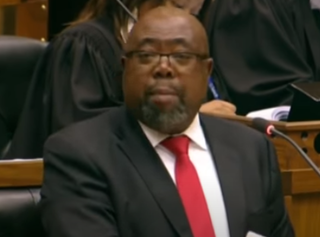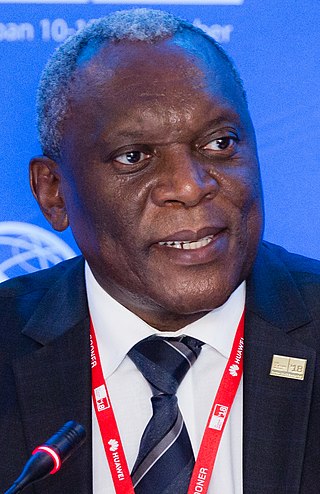
Jacob Gedleyihlekisa Zuma is a South African politician who served as the fourth president of South Africa from 2009 to 2018. He is also referred to by his initials JZ and clan names Nxamalala and Msholozi. Zuma was a former anti-apartheid activist, member of uMkhonto weSizwe, and president of the African National Congress (ANC) from 2007 to 2017.

The Directorate of Special Operations (DSO), commonly known as the Scorpions, was a specialised unit of the National Prosecuting Authority of South Africa formed by President Thabo Mbeki, tasked with investigating and prosecuting high-level and priority crimes including organised crime and corruption. An independent and multidisciplinary unit with a unique methodology which combined investigation, forensic intelligence, and prosecution, the Scorpions were known as an elite unit, and were involved in several extremely high-profile investigations, especially into the Arms Deal and into high-ranking African National Congress (ANC) politicians including Jackie Selebi, Jacob Zuma, and Tony Yengeni.
Nkosinathi Phiwayinkosi Thamsanqa Nhleko is a South African politician and former trade unionist from KwaZulu-Natal. He was the Minister of Police and Minister of Public Works in the second cabinet of President Jacob Zuma. In March 2024, he resigned from the African National Congress (ANC) and became the national organiser for Zuma's Umkhonto we Sizwe Party.

Corruption in South Africa includes the improper use of public resources for private ends, including bribery and improper favouritism. Corruption was at its highest during the period of state capture under the presidency of Jacob Zuma and has remained widespread, negatively "affecting criminal justice, service provision, economic opportunity, social cohesion and political integrity" in South Africa.

Fikile April Mbalula is a South African politician and current Secretary-General of the African National Congress (ANC) since December 2022. He was a cabinet minister between 2010 and 2023, most proximately as Minister of Transport from 2019 to 2023.

Emmanuel Nkosinathi Mthethwa is a South African politician who is currently serving as South African Ambassador to France. He represented the African National Congress (ANC) in the National Assembly of South Africa between 2002 and 2023, and he was a cabinet minister between September 2008 and March 2023.

Max Vuyisile Sisulu is a South African politician and businessman who was Speaker of the National Assembly from May 2009 to May 2014. A member of the African National Congress (ANC), he was a member of the party's National Executive Committee from December 1994 to December 2017.
Sicelo Shiceka was a South African politician who served as Minister of Cooperative Governance and Traditional Affairs from May 2009 until his death in April 2012. Before that, he was the Minister of Provincial and Local Government from September 2008 and May 2009. Throughout his service in the cabinet, he represented the African National Congress (ANC) in the National Assembly.
Lieutenant General Richard Naggie Mdluli was the head of Police Crime Intelligence in South Africa from 2009 to 2012. He was replaced by Chris Ngcobo.

General elections were held in South Africa on 7 May 2014, to elect a new National Assembly and new provincial legislatures in each province. It was the fifth election held in South Africa under conditions of universal adult suffrage since the end of the apartheid era in 1994, and also the first held since the death of Nelson Mandela. It was also the first time that South African expatriates were allowed to vote in a South African national election.
Events in the year 2013 in South Africa.

Thembelani Waltermade "Thulas" Nxesi is a South African politician and former trade unionist who was the Minister of Employment and Labour from May 2019 to June 2024. A representative of the African National Congress (ANC), he has been a member of cabinet since October 2011 and the Deputy National Chairperson of the South African Communist Party (SACP) since July 2012.

The private residence of former South African President Jacob Zuma is situated about 24 km (15 mi) south of the rural town of Nkandla in KwaZulu-Natal and is commonly referred to as the Nkandla homestead. During Zuma's presidency, the homestead was the subject of a major public controversy, sometimes referred to as Nkandlagate, concerning what were ostensibly security upgrades to Zuma's compound, at a cost of over R246 million. The use of public funds to make these improvements received significant media coverage and political opposition.

Siyabonga Cyprian Cwele is a South African politician who served in the cabinet of South Africa from September 2008 to May 2019, most recently as the Minister of Home Affairs between 2018 and 2019. He was appointed as the South African Ambassador to China in December 2020. He is a member of the African National Congress (ANC) and represented the party in Parliament from 1994 to 2019.

At former South African President Jacob Zuma's Nkandla compound and private residence in South Africa, a swimming pool officially deemed to have a dual purpose as a "firepool" was constructed. It was claimed that the pool was built as a security feature and security upgrade, as a source of water for firefighting. A controversy surrounded the construction of the pool.

Economic Freedom Fighters v Speaker of the National Assembly and Others; Democratic Alliance v Speaker of the National Assembly and Others [2016] ZACC 11 is an important judgment of the Constitutional Court of South Africa which finds that President Jacob Zuma breached the South African Constitution by failing to implement the recommendations in the Public Protector's Nkandla report.

Jacob Zuma's tenure as South Africa's fourth post-apartheid president began on 9 May 2009 and ended on 14 February 2018. He held office under a mandate from the parliamentary caucus of the African National Congress (ANC), which had governed South Africa since 1994 and which won comfortable majorities in the 2009 and 2014 national elections. His presidency was beset by controversy, and he faced, and defeated, an impeachment attempt and a record eight motions of no confidence in the South African Parliament, four of which went to a vote. His party asked him to resign in February 2018, ahead of the constitutional end of his second term.

Ayanda Dlodlo is a South African politician and former cabinet minister. A former member of Umkhonto we Sizwe, she became a Member of Parliament for the African National Congress (ANC) in 2009. Thereafter, she was appointed Minister of Communications (2017), Minister of Home Affairs (2017–2018), Minister of Public Service and Administration, and Minister of State Security (2019–2021).
Makhotso Magdeline "Maggie" Sotyu is a South African politician who is currently serving as Deputy Minister of Environment, Forestry and Fisheries since May 2019. She has been a deputy minister since 2010, formerly as Deputy Minister of Arts and Culture and Deputy Minister of Police, and has represented the African National Congress in the National Assembly since June 1999.
Ncediso Goodenough "Zizi" Kodwa is a South African politician and communications strategist who served as the Minister of Sports, Arts and Culture from March 2023 until his resignation in June 2024. Before that, he was the Deputy Minister of State Security from 2019 to 2023. He was formerly the national spokesperson of the African National Congress (ANC) from 2014 to 2018.












